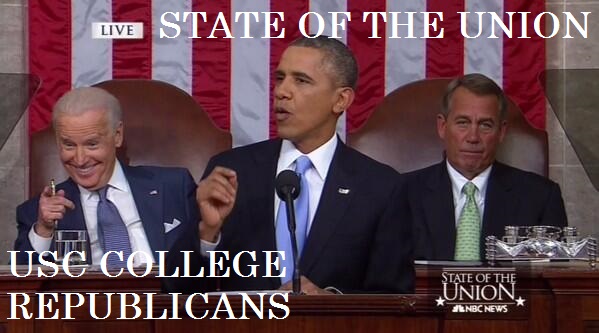State Of The Union: Obama's New Imperium

For a variety of reasons, the President found himself in a tough spot; as some panelists in the USC Annenberg School for Communication and Journalism panel in which I particpated last night pointed out, the speech was reminiscent of someone whose first halcyon days as leader of the free world are long behind him. An NBC News/Wall Street Journal poll showed last night that 63 percent of respondents believe that the country is on the wrong track. Unfortunately, the President did very little to assure the American people that progress still awaits.
The main theme of the address, in my opinion, was the role of the executive in our federal government, a role whose definition our President is sure to challenge in the upcoming months. He repeatedly referenced, hinted, or otherwise entertained the possibility of performing executive orders to carry out his agenda.
SEE ALSO: College Republicans And Democrats On Obama's State Of The Union
I say “his,” because, at this point in time, it really is his agenda. Congress, the most unproductive in our nation’s history, has stalled; and, of course, where he once urged Congress to act, then threatened them, he now seems ready and willing to resort to executive order to prevent a vote.
Executive orders, however, are a part of our government that very few people know about. All one needs to know is that they cannot technically legislate; they can only clarify an existing policy, or repeal an executive order made by a previous president which is still in effect. Obama’s upcoming executive order raising the minimum wage for federal employees will probably remain in effect for the foreseeable future. However, if he were to make one raising the national minimum wage, it would probably be ruled unconstitutional.
In this way, the president might still face obstacles even in trying to make executive orders. They cannot be too broad as to legislate or be pre-empted by existing federal law; nor can they be so narrow as to have little practical purpose. Additionally, how will the average voter be inspired by a narrow set of executive orders meant to kick-start a moribund Congress?
Is this the new imperium? Is this the way the President should be getting things done—by side-stepping Congress so that he can have his own way? Many other presidents before Obama had to make compromises with a divided Congress, all with more prolific results. One only needs to look to the outstanding working relationship that Ronald Reagan had with (Democratic) Speaker of the House Tip O’Neill to see that compromise can be done.
SEE ALSO: Chris Matthews Offers Lesson In Respectful Politics
The President expressed the sentiment that the United States’ role is “to promote justice, and fairness, and equality under the law, so that the words set to paper by our founders are made real for every citizen.”
I wholeheartedly agree, though I believe that every citizen might object to the impending expansion of executive power, if they took a look at those words written on paper a few hundred years ago.



